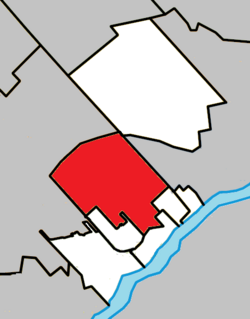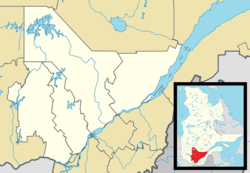Blainville, Quebec
| Blainville | ||
|---|---|---|
| City | ||
|
||
 Location within Thérèse-De Blainville RCM. |
||
| Location in central Quebec. | ||
| Coordinates: 45°40′N 73°53′W / 45.667°N 73.883°WCoordinates: 45°40′N 73°53′W / 45.667°N 73.883°W | ||
| Country |
|
|
| Province |
|
|
| Region | Laurentides | |
| RCM | Thérèse-De Blainville | |
| Constituted | July 1, 1855 | |
| Government | ||
| • Mayor | Richard Perreault | |
| • Federal riding | Thérèse-De Blainville | |
| • Prov. riding | Blainville and Groulx | |
| Area | ||
| • Total | 55.50 km2 (21.43 sq mi) | |
| • Land | 55.10 km2 (21.27 sq mi) | |
| Population (2011) | ||
| • Total | 53,510 | |
| • Density | 971.1/km2 (2,515/sq mi) | |
| • Pop 2006–2011 |
|
|
| Time zone | EST (UTC−5) | |
| • Summer (DST) | EDT (UTC−4) | |
| Postal code(s) | J7C | |
| Area code(s) | 450 and 579 | |
| Highways |
|
|
| Website | www |
|
Blainville is an off-island suburb of Montreal, in southwestern Quebec, Canada. Blainville forms part of the Thérèse-De Blainville Regional County Municipality within the Laurentides region of Quebec.
Blainville sits at the foot of the Laurentian Mountains. It is located 40 kilometres (25 mi) northwest of downtown Montreal.
Louis de Buade de Frontenac, granted the land, including what is today known as Blainville, to the elite members of society, in order to promote the development of New France. The recipients of the land became lords ("seigneurs"). This act created the Seigneurie des Mille Îles (Lordship of the Thousand Islands), located to the north of the Mille Îles River.
In 1792, the disagreement between Seigneur Hertel and Seigneuresse Lamarque caused the splitting of the lordship by a division called the Great Line (now known as the Boulevard du Curé-Labelle (Quebec Route 117).
Blainville is named for the third lord of the seigneurie, Jean-Baptiste Céloron de Blainville (1660-1756).
On June 14, 1968, the parish of Sainte-Thérèse-de-Blainville was split from the city of Blainville to form its own town.
As of the Canada 2011 Census, Blainville had a population of 53,510, a 15% increase compared to 2006.
The 2006 census found that 91.4% of residents spoke French as their mother tongue. The next most common languages were English (2.8%) and Portuguese (1.4%).
...
Wikipedia


